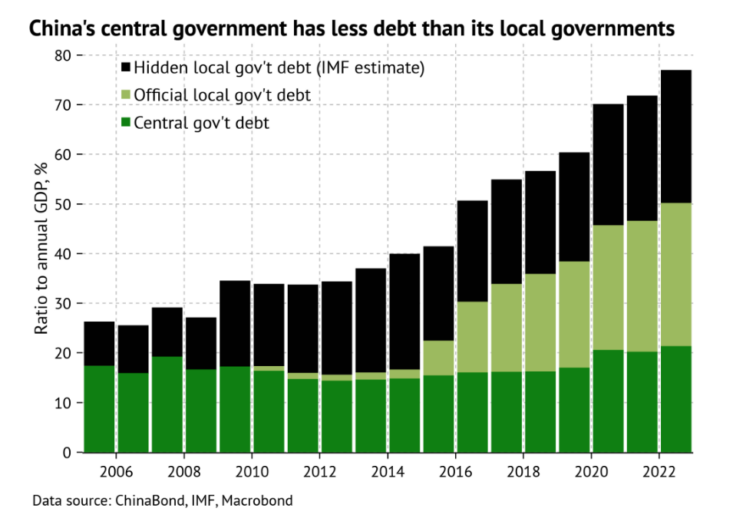recently asked me for my thoughts on Chinese macro policy:
Could you write another post summarizing the argument of your talks in Beijing, about fiscal vs monetary policy for China right now? Conventional wisdom is favoring fiscal so interested in your perspective.
First, we need to be clear about what it means to use “fiscal policy”. There is a sense in which governments are always doing fiscal policy, as they always have some level of spending and taxation. But when people discuss the issue of whether fiscal or monetary policy is more appropriate, they have something more specific in mind. The real question is whether fiscal policy should be used for the purpose of controlling the level of aggregate demand.In my view, monetary policy should always be set at a position where the expected growth in aggregate demand is equal to the policy objective. (That objective might be 4% NGDP growth in the US, although other objectives are certainly possible.) If the central bank enacts an appropriate monetary policy, then there is no role for discretionary fiscal policy. Full stop.China should enact the tax and spending policy that makes sense from a cost-benefit perspective, without any consideration of the impact on nominal spending. Monetary policy should then take that fiscal policy into account when policymakers adjust their policy instruments (monetary base, interest rates, reserve requirements, exchange rates, etc.)Western countries like the US have foolishly used fiscal policy to boost spending, and this has helped to create a public debt time bomb that will cause economic distress in the decades ahead. It is true that China’s central government debt is relatively low as a share of GDP, but as Batson points out in a , China’s local government debt is implicitly a liability of the central government:
Such a distinction would make sense if China were a federal state: if the central and local governments were independent entities with clearly defined constitutional and legal roles and separate finances. But China is not a federal state, and local governments are not separate from the central government. There is only one government throughout China; local governments are merely the authorized agents of this state.
The graph he provides shows a worrisome trend: When the public debt becomes excessive, governments are forced to raise distortionary taxes, or engage in other inefficient options such as hyperinflation. In contrast, monetary stimulus does not lead to an increase in the public debt, and hence is less costly than fiscal stimulus.Now let’s consider three cases where people have argued for fiscal stimulus. In each case, the arguments are faulty:Case 1: An economy not at the zero lower bound.In China, interest rates are still well above zero. In that case, there is no plausible argument that monetary policy is ineffective at boosting nominal spending. Even so, most Western experts seem to recommend fiscal policy. I have no idea why.Case 2: An economy where nominal interest rates are at zero and expected to stay there forever. In that case, the central bank should buy back any existing government bonds that are still paying positive interest rates with newly created zero-interest base money, and then begin buying other assets to boost nominal income. As once pointed out, such a policy would clearly be effective:
When the public debt becomes excessive, governments are forced to raise distortionary taxes, or engage in other inefficient options such as hyperinflation. In contrast, monetary stimulus does not lead to an increase in the public debt, and hence is less costly than fiscal stimulus.Now let’s consider three cases where people have argued for fiscal stimulus. In each case, the arguments are faulty:Case 1: An economy not at the zero lower bound.In China, interest rates are still well above zero. In that case, there is no plausible argument that monetary policy is ineffective at boosting nominal spending. Even so, most Western experts seem to recommend fiscal policy. I have no idea why.Case 2: An economy where nominal interest rates are at zero and expected to stay there forever. In that case, the central bank should buy back any existing government bonds that are still paying positive interest rates with newly created zero-interest base money, and then begin buying other assets to boost nominal income. As once pointed out, such a policy would clearly be effective:
To rebut this [pessimistic] view, one can apply a reductio ad absurdum argument, based on my earlier observation that money issuance must affect prices, else printing money will create infinite purchasing power. Suppose the Bank of Japan prints yen and uses them to acquire foreign assets. If the yen did not depreciate as a result, and if there were no reciprocal demand for Japanese goods or assets (which would drive up domestic prices), what in principle would prevent the BOJ from acquiring infinite quantities of foreign assets, leaving foreigners nothing to hold but idle yen balances? Obviously this will not happen in equilibrium.”
Case 3: An economy where nominal interest rates are zero but expected to rise above zero in the future.In that case, a central bank should engage in “level targeting”, by committing to return to the target path for nominal spending once interest rates rise above zero. Research by people like Paul Krugman, Michael Woodford and Gauti Eggertsson has shown that this sort of forward guidance is the optimal policy at the zero lower bound for interest rates, when the liquidity trap is not permanent.Once again, however, this is all a moot point for China, where nominal interest rates are still positive. Chinese policymakers should look at the mistakes made in the US and Europe, and avoid going down the same road.More By This Author:Were The 1960s A “Tightening Episode”? March Of 2025How Important Are The Issues?

